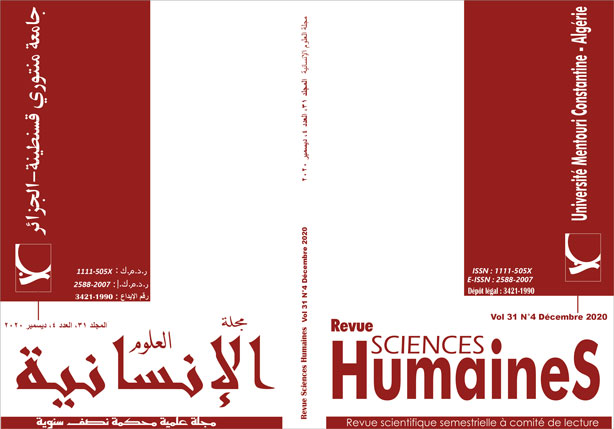The Effect of Collocational Success on Essay Grading: A Case of Algerian EFL Learners
الكلمات المفتاحية:
المتلازمات اللفظية من صنف الفعل الإسم، أعلى النقاط، المقالاتالملخص
تُعتبر المتلازمات اللفظية جزءا أصيلا و مهما من اللغة. يقوم هذا البحث بدراسة مستوى إتقان طلبة اللغة الانجليزية الجزائريين في جامعة الإخوة منتوري (قسنطينة) للمتلازمات اللفظية من صنف الفعل + الإسم. تقترح الفرضية الأولى أن مستوى طلبة اللغة الانجليزية الجزائريين ضعيف فيما يتعلق بالمتلازمات اللفظية بين الفعل و الإسم. أما الفرضية الثانية، فتقترح أن مقالات طلبة اللغة الانجليزية الجزائريين تفتقر إلى الاستعمال الصحيح للمتلازمات اللفظية بين الفعل و الإسم، مما يؤثر سلبا على النقاط الممنوحة. توصلت الدراسة إلى أن النقاط التي يمنحها الأساتذة لم تأخذ المتلازمات اللفظية على سبيل الاعتبار خلال التصحيح، بالرغم من كونها جزءا هاما يضمن الاستعمال السليم للغة، كما أنها تؤكد الأطروحتين المذكورتين سابقا، إضافة إلى ذلك كون الأساتذة إما غير واعين بأهمية المتلازمات اللفظية، أو أنهم لم يعيروها اهتماما خلال التصحيح لأنهم لم يُدَرسوها. يمكن ملاحظة ذلك من خلال الأخطاء الكثيرة على مستوى المتلازمات اللفظية في المقالات التي تحصلت على النقاط الأعلى.
التنزيلات
المراجع
Bahns, J. (1993). Lexical Collocations: A Contrastive View. ELT Journal 47/1, 56-63. doi: org/10.1093/elt/47.1.56
Benson, M. (1985). Collocations and idioms. Dictionaries, Lexicography and Language Learning. Oxford: Pergamon.
Darvishi, S. (2011). The investigation of collocational errors in university students’ writing majoring in English. Paper presented at the 2011 International Conference on Education: Research and Innovation, Singapore. IACSIT. Retrieved from: www.ipedr.com
Farrokh, P. (2012). Raising awareness of collocations in ESL/EFL classrooms. Journal
Studies in Education, 2, 55-74. doi: 10.5296/jse.v2i3.1616
Firth, J. R. (1957). Papers in Linguistics. Oxford: OUP, 17, 402-413. doi.org/10.1111/j.1473-4192.2007.00164.x
Gabrielatos, C. (1994). Collocations: Pedagogical implications, and their treatment in pedagogical materials. Unpublished essay, Research Centre for English and Applied Linguistics, 1-17. Retrieved from: www.academia.edu
Ganji, M. (2012). On the effect of gender and years of instruction of Iranian EFL learners’ collocational competence. English Language Teaching, (5), 123-133. doi:
5539/elt.v5n2p123
Hardi , A. (2008). A collocation-based approach to Nepali postpositions. Journal of Corpus Linguistics and Linguistic Theory, 4(1), 19-61
Hatch, E., Brown, C., 1995. Vocabulary, semantics, and language education. CUP.
Henriksen, B. (2013). Research on L2 learners’ collocational competence and development –a progress report. 29-56. Retrieved from: www.eurosla.org
Lewis, M. (1997). Implementing the lexical approach. England: Language Teaching Publication, 8, 34-44. doi.org/10.1002/j.1949-3533.1999.tb00159.x
McKeown, K. R., Radev, D. R. (1995). Collocations. 1-19. New York. Retrieved from: clair.si.umich.edu
Wray, A. (1999). Formulaic language in learners and native speakers. Centre for Language & Communication Research, 32, 213-231.
Wood, D. (2009). Effects of focused instruction of formulaic sequences on fluent expression. in second language narratives: A case study.12, 39-57. Retrieved from https://journals.lib.unb.ca/index.php/CJAL/article/view/19898/21736
التنزيلات
منشور
كيفية الاقتباس
إصدار
القسم
الرخصة

هذا العمل مرخص بموجب Creative Commons Attribution-NonCommercial-ShareAlike 4.0 International License.

















